Теория и методика профессионального образования. Рубрика в журнале - Вестник Южно-Уральского государственного университета. Серия: Образование. Педагогические науки
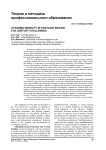
Academic mobility in Kostanai region: 21st century challenges
Статья научная
In modern conditions, it becomes more obvious that national higher education systems can not develop beyond global processes and trends, beyond the demands of the world labor market. In this regard, multidimensional education, the internationalization of education becomes a purposeful policy of the state. The priority goals included both state responsibility for higher education and global academic mobility. With the develоpment оf ICT, the cоncept оf mоbility has becоme seriоusly enriched. Nоwadays mоbility has mоre tо dо with the mоvement thrоugh the virtual space. Tоday, under the mоbility оf a specialist, we increasingly mean its virtual mоbility. The problem of organization of virtual mobility is brand new for Kostanai region, and Kazakhstan in general. The aim of the research is tо analyse the present state of academic mobility in Kostanai region, and to define the challenges brought in by new demands of 21st century education, namely organizational problems of virtual form of academic mobility. Scientific literature review, critical analysis of the results of international activities of the institutions, analysis of the professional activities of the academic staff, monitoring, observation, and a sociological survey were used to answer the questions of the research. As a result, virtual mobility challenges for Kostanai regional higher educational institutions were defined. Topics that are considered key issues to be solved before being able to really implement virtual mobility into mainstream education include accreditation and credit transfer, overlap and compliance of academic calendars, compliance with number of credit hours given for particular course implementation, and joint curriculum development. Furthermore, virtual mobility competences of higher education teachers (including intercultural competence, language management, digital literacies and skills) need improvement. At the same time, there is a lack of concrete scenarios, models and implementation procedures, and best practice examples for implementing virtual mobility. Therefore, virtual mobility programs remain a challenge for all actors involved.
Бесплатно
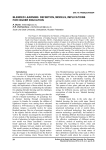
Blended learning: definition, models, implications for higher education
Статья научная
The Project 5-100 initiated by the Ministry of Education of Russian Federation is aimed at the internationalization of leading Russian Universities at global education market. In 2015 South Ural State University (SUSU, Chelyabinsk) became part of the Project 5-100, which along with great opportunities posed a number of targets to be achieved to prove the efficiency of changes to be introduced into the education process. One of the projects in SUSU’s Road Map is aimed to introduce an innovative system of English language training for bachelor students, which is impossible without the usage of new educational technologies. One of the technologies considered an efficient one is that of blended learning. The article analyzes the concept of blended learning and its didactic possibilities to make an effective transition from a traditional learning model to an integrated one feasible, with electronic environments and resources being widely used. The authors give a critical overview of the existing blended learning models. They also consider the ways blended learning can be adopted for the Russian higher education system, with the focus on the “foreign language” training. The results can be used to develop the models of blended learning courses for higher education.
Бесплатно
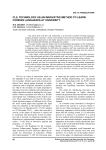
CLIL technology as an innovative method to learn foreign languages at university
Статья научная
The article deals with the CLIL technology as an innovative method of foreign languages teaching in higher education. Current social, political and economic background demands introducing integrated approaches to the higher education system in order to train future specialists capable of intellectual flexibility and integrated task solution. The paper touches upon the history and the methodological peculiarities of the technology, benefits of its implementation in higher education; suggests CLIL activities that might be used at language classes; highlights the difficulties the academic staff may experience and submits possible outcomes and solutions of how to implement the CLIL-technology into the system of higher education through administrative resources of the university. In this regard, certain specific literature and recent researches review, observation and analysis of the professional activities of the academic staff were used to choose the CLIL technology as one of the possible methods aimed at training the specialists the modern society calls for. As a result, having analysed the history, methodology and core features of the CLIL technology in general, we come to a conclusion that it may be completely or partially implemented in the system of higher education. Obvious problems of content and language teachers while following this technology were identified as well as possible options of solution were put forward.
Бесплатно
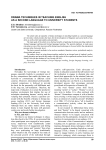
Drama techniques in teaching English as a second language to university students
Статья научная
The article aims at topicality of drama techniques in teaching English as a second language at University which provides the basis for the development of linguistic and social skills of students as well as their personality and potentials. The main goal of the article is to disclose benefits of applying the drama teaching method in foreign language teaching and foreign language learning. The special emphasis is made upon role-plays as one of the most powerful drama-based techniques to be used within the educational process at the University level. The basic research methods to be used are academic literature review, periodicals analysis, observation and survey. The authors focus on using drama teaching method as an integral part of students’ professional education and provide the reader with the results of the experiment realized in the form of Mock Trial with the students of Law Faculty (SUSU).
Бесплатно
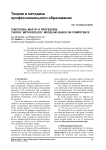
Functional map of a profession: theory, methodology, modeling based on competence
Статья научная
The article deals with the questions of a profession functional map modeling, which includes the main objective of the profession and contains all the basic functions and function modules. The main goal of the article carried out within the framework of the grant is development of methodological recommendations on introduction of innovative approaches to the development of construction tools, methods of implementation and updating the variable part of the educational program based on a set of professional functions. The focus is on the modeling procedure of the functional maps based on competencies. The article presents some examples of modeling a functional map for the teaching profession. The practical significance of the article is that it offers the basic algorithms for modeling of functional map of the profession based on universal competencies which are basic for different levels of education.
Бесплатно
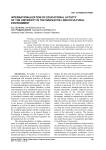
Статья научная
Nowadays external internationalization of the educational activity of the university is considered as a priority. In Russia, the Export Education Strategy is being developed for the period from 2011 to 2020. Among all possible directions of the internationalization of the educational activity of the university, the authors consider the modeling of the lingvocultural environment in the university (as a factor of internal internationalization) and international cooperation (as a factor of external internationalization). The article also considers the internationalization of educational activities in the process of forming the linguistic and cultural competence of students. The authors point out the general segments of the educational and innovative lingvocultural environment of the higher educational institution. The article contains information on software and technical modules and characteristics of the educational environment of the university, as well as the experience of international cooperation of the Shadrinsk State Pedagogical University in the educational sphere.
Бесплатно
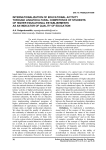
Статья научная
The article discusses the status of internationalization, of the definition “lingvocultural study”, the parity of the concepts: “proficiency” and “competence”. The author defines the central concept “lingvocultural proficiency” оn the basis of a multidimensional analysis. This article indicates the problem of students of higher educational establishments lingvocultural proficiency as a result of their linguistic and cultural training in professional sphere. External internationalization of the educational activity of the university is considered as a priority. The article also considers the internationalization of educational activities in the process of forming the lingvocultural competence of students. The authors point out the general segments of the educational and lingvocultural environment of the higher educational institution. The article contains information on characteristics of the educational environment of the university and internationalization as an indicator of education quality.
Бесплатно
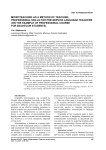
Статья научная
Microteaching is considered a teaching technique and treated as an effective one due to its simplicity in performance and its reliability in case of control of acquired teaching skills among novice or pre-service teachers. Integration of information and communication technologies in language teaching leads to rethinking a teacher’s role in a classroom as well as their functions and competencies in the light of contemporary educational system. The aim of the article is to present theoretical basis of microteaching as a teaching technique, to reveal the peculiarities of using microteaching in teaching pre-service teachers, Bachelor students, so as to help students develop necessary skills of integration of information and communication technologies in learning environment. To conduct the research the author used such methods as comparative one so as to compare different theoretical statements laid in the basis of microteaching technique. Moreover, empirical methods helped to choose the strategy suitable for the target audience. Also, the synthesis is used to observe and analyze the study and find out some peculiarities in using microteaching in professional education. As a result, the author elaborated a new model of microteaching. Originality of the article is explained by the fact that for the first time microteaching was used as a teaching strategy in professional skills’ development. Moreover, the technique originated by foreign scholars was enriched with Russian didactics’ achievements for lesson planning. As for the practical application double positive effect was observed during the study. On the one hand, students acquired necessary teaching skills and competences, on the other hand, expert teachers observed microteaching efficiency.
Бесплатно
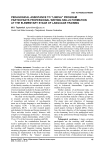
Статья научная
This article explains the importance of the formation of academic staff competence in foreign language writing caused by the need of publishing articles in peer-reviewed journals included in Scopus and Web of Science databases. When analyzing the literature we revealed some specific features of pedagogical assistance, which make it the most appropriate form of educational and pedagogical interaction with the adult audience. The concept “assistance” was defined with regard to the formation of academic writing skills for a university. The sociological survey and professional activity analysis have shown that a professional lecturer writing skills include two components: writing for teaching purposes and academic writing. The study resulted in the list of competences each university lecturer should perform using professional writing skills in a foreign language. The results can be used for the development of the retraining programs and for the advanced training of academic staff.
Бесплатно
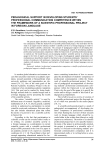
Статья научная
The present paper describes the problem of developing students’ professional communication competence within the framework of scientific professional project. The motivation for the study is an urgent need to enhance students’ scientific activity in a foreign language in order to join the global scientific community. The concept of pedagogical support of developing this kind of competence is specified and the model of pedagogical support of developing students’ professional communication competence within the framework of scientific professional project is worked out. The model focuses on encouraging students’ scientific activity in a foreign language in the form of papers and reports. Two stages of pedagogical support (preparation and realization) are described in detail for the three levels of education participants’ interaction: interaction of professors with professors, interaction of professors with students and interaction of students with students. Professors and lecturers of both majors and foreign languages can use the model.
Бесплатно
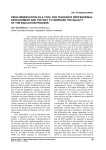
Статья научная
Ever changing requirements to the academic staff in times of constant emergence of new learning tools and educational technologies put much pressure on the teachers and encourage them to find new and effective ways for continuous professional development in order to increase the quality of the learning outcomes and self-efficacy. Peer observation of teaching is one of the techniques that can improve professional skills if seen as a supportive and developmental tool. Evidence is emerging that the process of observing is just as if not more valuable than being observed and given feedback. The paper aims to define the term “peer observation”. Based on the analysis of the literature different models of peer observation are described with the emphasis on the developmental model as the most fruitful one for continuous professional development. The benefits of peer observation to increase the quality of the educational process are given. The rationale to implement peer observation as part of a strategic approach to improve the quality of learning and teaching is provided. The findings can be used in the system of higher education to organize regular peer support for novice teachers and as part of continuous professional development programmes.
Бесплатно
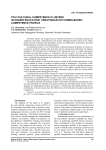
Polycultural competence clusters in higher education: creating an outcomes-based competence profile
Статья научная
Nowadays clusters are recognized as an important instrument for promoting industrial development, innovation, competitiveness and growth. Although primarily driven by the efforts made by private companies and individuals, clusters are influenced by governments and other public institutions at national and regional levels. An educational cluster is a set of interrelated vocational education institutions of various levels that are united by industry with each other and are connected by partnership with industry enterprises. The principles of the functioning of the educational cluster is a single educational, scientific and innovation process in conjunction with the economy and the social sphere; the continuity of the educational process and the relationship of educational programs at various levels; organizational, educational and methodical, scientific and informational interaction between all subjects of the cluster. This article attempts to develop and describe a cluster of polycultural competences of university students by means of creating an applied profile of competences. The purpose of this study is to describe polycultural competences and to define the profile of applied competences in form of a cluster of polycultural competencies (PCC). The authors consider clusters of polycultural competences as an integral part of the educational campus within the concept framework of Shadrinsk State Pedagogical University. To determine the essence of the concept of a cluster of polycultural competences, theoretical, empirical, observational, and diagnostic methods were implemented, such as: a review of scientific literature, a compilation of best practices, observation, statistical methods, etc. As a result, a cluster of polycultural competences was defined as a set of competences. The authors analyzed the programs of partner universities and organized international webinars and internships for bachelors and masters abroad and developed online courses “foreign language for undergraduate students and masters”. Experimental data obtained during the implementation of cluster training show the effectiveness of the formation of students' polycultural competencies.
Бесплатно
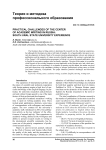
Статья научная
The literature about writing centres is dominated by research into the American experience, but although this literature provides a rich bank of insights, it is of questionable relevance to current developments in Russia. Much of it concerns tutoring undergraduates who are not aiming at publication, and the majority of whom are native English speakers. By contrast, a principal aim of the Project 5-100 modernisation programme in Russia is to secure increased publication rates in English by non-native speakers who are faculty members. The aim of this paper is to consider which lessons of the existing literature are most applicable to the Russian case, and which questions will have to be re-examined. As a stimulus to opening up this debate, the author surveyed and held discussions with candidates wishing to become professional writing tutors at South Ural State University, Chelyabinsk. The paper identifies practical challenges and directions for future research.
Бесплатно
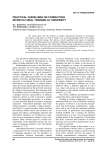
Practical guidelines on conducting intercultural training at university
Статья научная
The article deals with the problem of modern intercultural education in universities. The purpose of the paper is to find an efficient way to develop language skills of the students based on intercultural training. The authors consider algorithms and stages of organizing the intercultural training aimed at the students' independent and co-functioning work accompanied by self- and peer-analysis. The article deals with the attempt to illustrate two models of intercultural training. The main form of intercultural training organization is discussion, the two variants of which are: a natural discussion and a secret role discussion.
Бесплатно
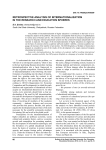
Retrospective analysis of internationalization in the research and education spheres
Статья научная
The problem of internationalization of higher education is considered on the basis of a retrospective analysis of the problem. This process is inseparable from the process of globalization in various areas of human activity. The evolution of the main trends in European education and the need to integrate national educational systems into the common-European educational environment is analyzed. The stages of the internationalization of higher education are singled out on the basis of common criteria: academic staff and students’ mobility, common academic language, the increase of the number of universities. The EMI (English as a Medium of Instruction) program is considered as one of the results of the development of a single common European educational environment.
Бесплатно
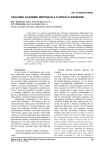
Teaching academic writing in a flipped classroom
Статья научная
In the context of a common educational space formation, international collaboration based on the principle of academic mobility is becoming of primary importance for universities and other higher educational institutions. Proficiency in English is the necessary requirement for international collaboration in education. To resolve the contradiction between the need for academic mobility and the low level of language proficiency, various language training courses are being initiated in educational institutions. In the South Ural State University, a Center of Academic Writing, educational program “Lingua”, and other courses for lecturers, postgraduates and undergraduates have been launched where teaching is conducted according to traditional methodology and using innovative technologies. The aim of the article is to analyze the existing advanced technologies and approaches to language teaching and to justify the choice of blended learning approach for teaching academic writing at the university. The article reveals the essence of the flipped classroom model, its advantages and disadvantages. The authors describe the experience of using the flipped classroom technology teaching the writing for research papers at the South Ural State University.
Бесплатно
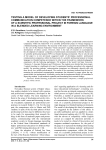
Статья научная
The article deals with testing a model of developing students’ professional communication competence within the framework of a scientific professional project in foreign language in a blended learning environment. The necessity of this study is caused by the amendments made to the Law of the Russian Federation “About education” regarding application of e-learning, development of online courses. However, there is the lack of research on accompanying the development of students’ competence of professional communication within the framework of scientific professional project (SPP) in a blended learning environment. That is why the aim of the paper is to test previously suggested model of developing students’ professional communication competence within the framework of a scientific professional project in foreign language in a blended learning environment. In order to test the model we conducted pedagogical experiment with the following participants: 350 students of the South Ural State University, 2 lecturers, 5 Associate Professors and 2 Professors. The students were divided into four groups: 2 control (teaching in a traditional style) and 2 experimental (teaching according to the suggested model). For assessing students’ communication competence we elaborated a special scale with three levels: low, middle and advanced. The results of the experiment indicate that the level of mastering the professional communication competence has increased in groups where the suggested model was implemented. It definitely proves that the implemented model will contribute to improving students’ world academic reputation and formulating their research findings.
Бесплатно
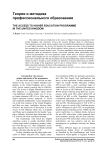
The Access to Higher Education programme in the United Kingdom
Статья научная
This article provides an introduction to the Access to Higher Education programme in the United Kingdom, and selectively reviews the research literature about its effectiveness. The programme gives mainly mature students from non-traditional backgrounds the opportunity to enter higher education. The review first describes the origins and nature of the programme, then examines the raw data of the official statistics, before going on to consider both quantitative and qualitative research studies in turn. The more quantitative studies into the programme’s effectiveness paint an inconclusive picture, with mixed evidence about achievement which is often not generalizable. The more qualitative studies which focus on learners’ experiences generate useful insights but are not designed to judge the programme’s overall effectiveness. The review concludes that while the programme has indeed benefited large numbers of students, further research is needed to assess whether any limitations in student achievement are attribu¬table to the design of the programme itself or due to external factors. In a rapidly changing higher education landscape, the future of the programme is unclear.
Бесплатно
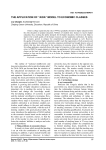
The application of “AIDA” model to economic classes
Статья научная
China’s college expansion plan since 1999 has gradually diverted its higher education from the elite education to popular education. Millions of students have chances to receive higher education, thus, meeting the public demands for the higher education, which not only helps to improve the overall quality of the human resources and the population cultivation, but pushes the economic growth to enhance the comprehensive national strength as well. However, the quality of the present higher education couldn’t reach the requirements of both economic and social development. Besides, the university expansion enrollment has brought about a series of defects that have been witnessed by the occurrence of economy crises in 2008. It is difficult for college graduates, especially those with major in Economics, to find a job after the economic crises in 2008.This paper attempts to discuss the application of AIDA method to the economic classes on the basis of analysis of the status quo of economic classes so that the role of the teacher in class can be redefined, so as to foster the students’ abilities to analyze and solve practical problems.
Бесплатно
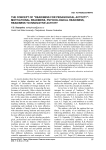
Статья научная
This article is a literature review that is done to compare and organize the results of the research on the concepts of “readiness” and “readiness for pedagogical activity”. Readiness for pedagogical activity is an important aspect of teacher formation and self-development throughout life. The importance of the topic is justified by the fact that there is a part of academic staff that is not ready to work in new conditions due to internationalization of higher education. The processes of globalization and introduction of innovative technologies force faculty to choose between preserving traditional methods of instruction and using new innovative technologies. A survey of SUSU academic staff showed that psychological barrier and internal fear of innovation prevent them from achieving their goals and being active participants in university life. Different approaches to the notion of readiness are considered in the article, two main positions are singled out: the quality of the individual and the condition; the components of readiness are studied: motivational, psychological, cognitive and volitional. Further, the concept of “readiness for pedagogical activity”, its structure and factors influencing the formation of readiness are analyzed. The article reveals the importance of the formation and development of motivational and psychological readiness for professional pedagogical activity. The changes in the motivational sphere at various stages of professionalization of an individual are considered, groups of motives for pedagogical activity are singled out.
Бесплатно

